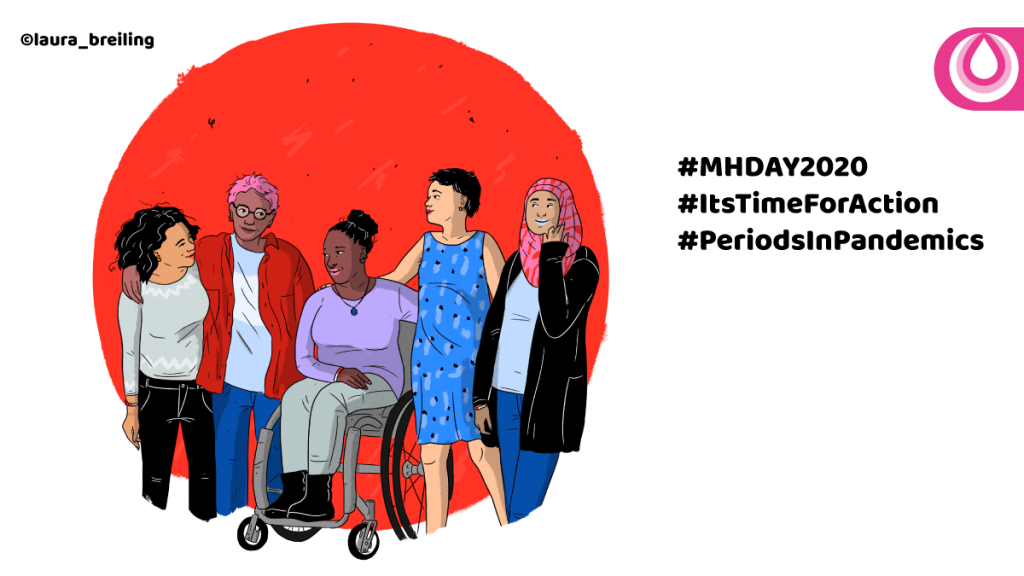It’s Time For Action:
Menstrual Hygiene Day
May 28th is Menstrual Hygiene Day, a day to raise awareness and fight taboos around menstrual hygiene. For nearly a quarter of the world’s population, menstruation is a monthly reality- and many people lack access to hygiene products and sanitation due to a lack of knowledge and/or accessibility. Taboos, stigmas and myths cause young people to miss school or work, which holds them back.
By taking action on menstrual hygiene, menstruators around the world can have more access to education, wealth, health, and greater self-esteem. This chart explains how:

All around the world, menstruators face obstacles to managing their periods. Many youth- boys and girls- do not have medically accurate information on menstruation or reproductive health. Inadequate education leads to stigma, shame, and taboos, which can keep menstruators out of school, work, and public life. Taboos frame menstruation as something “weak” or “dirty,” rather than a normal, healthy, biological function.
Globally, 2.3 billion people lack basic sanitation services including hand washing facilities. This means that some schools and communities do not have clean, running water, or proper disposal stations. Poor hygiene can lead to physical health risks, like urinary tract infections.
People with disabilities and trans and gender non-conforming menstruators face more obstacles to accessing safe, clean toilets to manage their periods. Reusable products may be a cost-effective alternative, but cost more up front and require soap and running water to clean.
In some countries, a period is an expensive burden. In Malawi, pads can cost roughly an entire day’s salary. In Kenya, nearly 2/3 of menstruators can’t afford sanitary pads. Using make-shift products can lead to infection or toxic shock syndrome.
This is an issue around the world- including in the US, where menstrual education is substandard at best. This means that boys, girls, trans, and gender-non-conforming youth do not receive crucial information about puberty, menstruation, or reproduction. In fact, only 13 states require sex education (where menstruation education usually falls), be medically accurate.
In the US, most states tax tampons, pads, cups, etc. as “luxury items” and SNAP and other federal assistance programs do not allow menstruators to use food stamps to purchase pads or tampons because they are classed as “luxury.” I don’t know about you, but I have never been on my period and thought of a pad or tampon as a luxury. Some states and cities are moving to eliminate these taxes, which place an extra burden on menstruators (those products are expensive already)! The average menstruator spends roughly $300 a year on products.
Many schools do not offer low-cost menstrual hygiene products in restrooms or through the clinic. For incarcerated menstruators, obstacles are increased; menstruators are charged high rates for lower quality products, or are given so few pads or tampons, they have to wear them for multiple days. This is demoralizing for menstruators.
More often than not, trans and gender-non-conforming menstruators are erased from the conversation entirely, leading to obstacles about which toilet to use and how to seek medical help when needed.
It’s beyond time for action! You can break the stigma and make change by talking to your friends about menstruation, lobbying your school district for medically-accurate reproductive health education, encouraging your school and local library to get copies of The Care and Keeping of You and The Period Book to educate yourself and your friends on menstruation, and support local organizations that collect and distribute menstrual hygiene products.
Here are some more great organizations to support:
More organizations can be found here!

Related Reading
Periods in Pandemics Infograph
Period Positivity by Tara Kimbrough
State of the Girl: Still Work to Do by Zvisinei Dzepasi
Sources
https://store.lunette.com/blogs/news/education-and-periods-in-the-us
https://www.plannedparenthoodaction.org/issues/sex-education/sex-education-laws-and-state-attacks
https://www.unicef.org/press-releases/fast-facts-nine-things-you-didnt-know-about-menstruation
https://www.globalwaters.org/resources/assets/water-currents-menstrual-hygiene-day-2019
https://en.wikipedia.org/wiki/Tampon_tax
https://www.globalcitizen.org/en/content/menstrual-hygiene-day-education/

3 thoughts on “It’s Time For Action: Menstrual Hygiene Day”